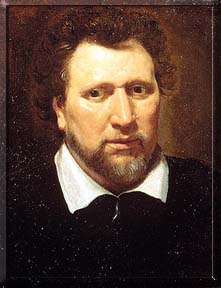LITERATURA INGLESA
Ben Jonson (ca. 1572 - 1637)
Poemas

Hymn to Diana (Himno a Diana)
Queen and huntress, chaste
and fair,
Now the sun is laid to sleep,
Seated in thy silver chair,
State in wonted manner keep:
Hesperus entreats thy light,
Goddess excellently bright.
Earth, let not thy envious
shade
Dare itself to interpose;
Cynthia's shining orb was made
Heaven to clear when day did close:
Bless us then with wishèd sight,
Goddess excellently bright.
Lay thy bow of pearl
apart,
And thy crystal-shining quiver;
Give unto the flying hart
Space to breathe, how short soever:
Thou that mak'st a day of night--
Goddess excellently bright.
Reina y cazadora, casta y hermosa, ya el sol se ha acostado a dormir, sentada en tu silla de plata, el estado en la manera habitual guarda. Héspero implora tu luz, diosa excelentemente brillante.
Tierra, que tu envidiosa sombra no ose interponerse; la reluciente orbe de Cintia la hicieron para aclarar el cielo cuando se cerrase el día: bendícenos con la vista deseada, diosa excelentemente brillante.
Deja el arco de perla a un lado, y el carcaj reluciente como el cristal; dale al ciervo que huye espacio para respirar, por corto que sea: tú que haces día de la noche, diosa excelentemente brillante.
Simplex munditiis (Lo natural es elegante)
Still to be neat, still to
be drest
As you were going to a feast;
Still to be powdered, still perfumed
Lady, it is to be presumed,
Though art's hid causes are not found
All is not sweet, all is not sound.
Give me a look, give me a
face
That makes simplicity a grace,
Robes loosely flowing, hair as free,
Such sweet neglect more taketh me
Than all the adulteries of art;
They strike mine eyes, but not my heart.
Siempre estar arreglada, siempre estar vestida como si fuerais a una fiesta; siempre estar empolvada, siempre perfumada, señora, es de presumir que, aunque las causas ocultas del arte no se descubran, no todo es dulce, no todo es auténtico.
Dadme una mirada, dadme un rostro que haga de la sencillez gracia, ropas que fluyan sueltas, cabello también libre, tal dulce descuido me conquista más que todas las falsedades del arte: me llegan a los ojos, pero no al corazón
To Celia (A Celia)
Drink to me only with
thine eyes,
And I will pledge with mine;
Or leave a kiss but in the cup
And I'll not look for wine.
The thirst that from the soul doth rise
Doth ask a drink divine;
But might I of Jove's nectar sup,
I would not change for thine.
I sent thee late a rosy
wreath,
Not so much honouring thee
As giving it a hope that there
It could not withered be;
But thou thereon didst only breathe,
And sent'st it back to me;
Since when it grows, and smells, I swear,
Not of itself but thee!
Bebe a mi salud solo con los ojos, y yo brindaré con los míos; o deja un beso sino en la copa y no buscaré vino. La sed que del alma surge pide bebida divina; pero aunque pudiera del néctar de Júpiter sorber, no lo cambiaría por el tuyo.
Te envié hace poco una corona de rosas, no tanto honrándote como dándole esperanza de que ahí no pudiera marchitarse, pero tú solo le respiraste encima y me la devolviste; desde entonces lozanea y huele, lo juro, ¡no por sí sino por ti!
The shadow (La sombra)
Follow a shadow, it still
flies you;
Seem to fly it, it will pursue:
So court a mistress, she denies you;
Let her alone, she will court you.
Say, are not women truly, then,
Styled but the shadows of us men?
At morn and even, shades
are longest;
At noon they are or short or none:
So men at weakest, they are strongest,
But grant us perfect, they're not known.
Say, are not women truly, then,
Styled but the shadows of us men?
Seguid una sombra, siempre os huye; fingid huir de ella, os seguirá: así, cortejad a una dama, os niega; dejadla en paz, os cortejará. Decid: ¿no se declara de las mujeres con razón, pues, que no son sino las sombras de nosotros los hombres?
Por la mañana y al atardecer las sombras son más largas; al mediodía son o cortas o nada: así, cuando los hombres estamos más débiles ellas están más fuertes, pero si se nos encuentra perfectos, a ellas no se les reconoce. Decid: ¿no se declara de las mujeres con razón, pues, que no son sino las sombras de nosotros los hombres?